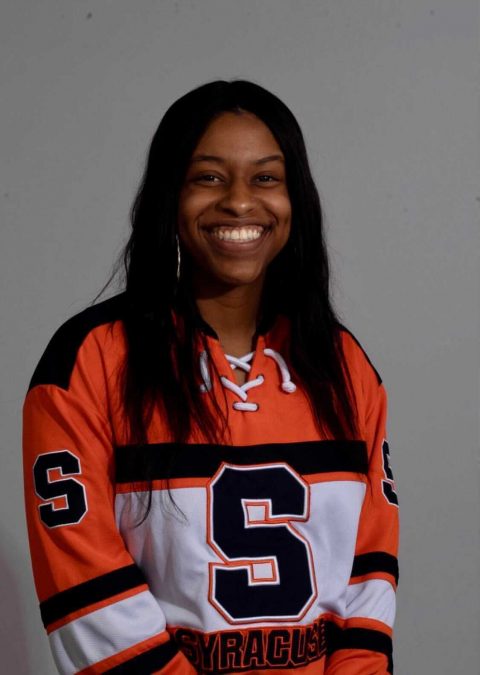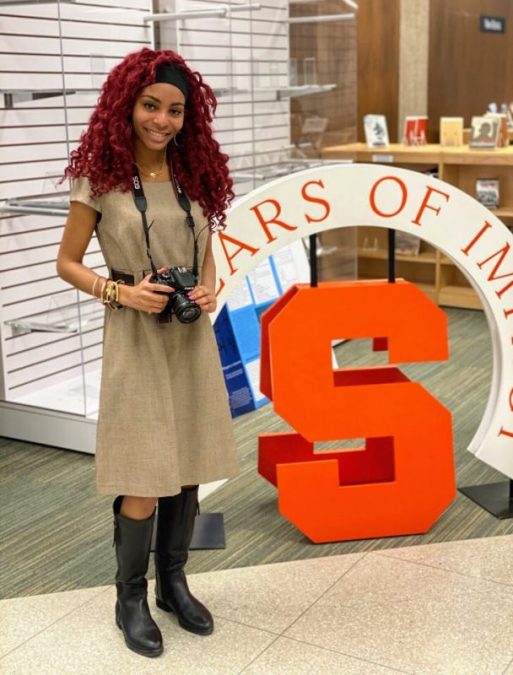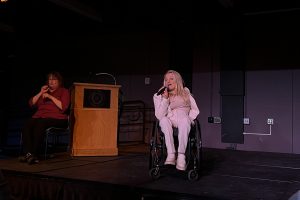Women’s History Month: Highlighting Black women leaders on campus
Women’s History Month: Highlighting Black women leaders

Only 7 percent of student body presidents in the 2017-2018 school year were Black women, according to The American Student Government Association. Breaking these barriers, graduate student Kennedy Hagens and seniors Damilola Olatunji and Justine Hastings lead three different SU organizations, using their positions to not only positively impact the Syracuse community but also display the importance of Black women leadership.
Kennedy Hagens
Hagens is a graduate student at SU’s Falk College of Sport and Human Dynamics. Before she started her master’s program, she was president of Otto’s Army, diversity and inclusion co-chair for the SU Student Association, student liaison for the disability community group, Falk Peer Mentor and a member of Alpha Kappa Alpha Sorority Incorporated.
“I feel I (could) have gotten a few more opportunities if I was a white woman,” Hagens says. “You would see my face everywhere.”

Through her experiences, Hagens wanted more representation on campus.
“Most of the leaders on this campus do tend to be men and white men at that,” Hagens said. “I think it’s very, very important for other women coming onto this campus to see women in power, especially women of color.”
These campus demographics drove her to run for Otto’s Army president her senior year. As president, Hagens endured hardships as a woman leader of an athletic organization, recalling a specific instance where she felt overlooked in discussion with other members of the athletic department.
“It was almost like I wasn’t even there, despite my title,” Hagens said. “It was almost like they were talking through me or giving me fluff questions.”
The sports-related questions would be directed at men, Hagens added. She said she often had more productive conversations with other women and even had to go and find a woman to let her into the dome once, despite wearing clothing that was only reserved for Otto’s Army.
Despite these challenges, Hagens learned a lot as an undergraduate student leader.
“Everything that I learned in the groups that I’ve been a part of have helped me to work with people of different backgrounds and personality types,” Hagens said.
In graduate school, she’s transferred her adaptability and problem-solving skills to her new leadership positions. Hagens currently serves on Falk’s Public Advisory Council and the college’s Diversity and Inclusion team. She is also actively involved in the graduated chapter of AKA Sorority Incorporated.

Damilola Olatunji
Olatunji is the president of the African Student Union. Joining as a freshman, Olatunji wanted the organization to showcase the welcoming nature of African culture.
“I just didn’t feel that open family vibe,” Olatunji said. “That was something that I wanted to incorporate into the organization.”
The following year, she joined the organization’s executive board. Olatunji said that ASU’s executive board has always included strong women that had a big impact on the organization. She wanted to follow in their footsteps, despite having the pandemic as a hurdle.
However, Olatunji and the executive board have used the pandemic to their advantage.
“There were a lot of events that we wanted to have that we couldn’t afford,” Olatunji said. Subtracting venue costs saved money for ASU and provided more opportunities for events that wouldn’t have been possible before.
Within her undergraduate career, Olatunji was vice president of the Caribbean Student Association and president of the National Association of Black Accountants. As a marketing and accounting major, she recently joined the SU Student Association’s finance board. This year, she’s more focused on the finance board and ASU.
Olatunji said she is proud that she’s been able to be a successful leader during the pandemic. It is important for her to be a supportive and understanding leader for her executive board.
“I’m not just being a leader that puts on events and makes stuff happen,” Olatunji said. “I also care about the members.”
Olatunji wants to see more women of color in leadership. Currently, she said she is one of about two or three women of color serving on the finance board.
“If we want to see more Black events, we need to have more Black people,” Olatunji said. “I think it’s important to be a woman leader but also to let people know that you’re a women leader so that people can be encouraged to join.”
After graduating, Olatunji plans to obtain her master’s in business analytics.
“I don’t want to work big business,” Olatunji says, “I want to do something that makes an actual difference.”
Justine Hastings
Hastings is a double major in secondary English education and English and textual studies and serves as SU’s Student Association president. Before running for office, she saw herself as a team contributor and never took on any leadership roles. She had just joined the organization when she decided to run.
“I was completely new to SA, which I said often during the campaign would be a benefit,” Hastings said. As a newcomer, she wanted to provide a fresh perspective.

Hastings was inspired to run because of #NotAgainSU’s request for access to the school’s board of trustees. Learning that the student association president serves the board, she said it was important for an advocate and member of these communities to share the importance of #NotAgainSU’s requests.
Hastings and vice president Ryan Golden ran for office with the mission to be a better resource for students on campus.
“It was about supporting all students but especially supporting and listening to marginalized students on campus,” Hastings said. “We shouldn’t be waiting for like these hate crimes to happen to begin caring about certain communities.”
One of her goals has been to give students a vote on the board of trustees.
“We don’t have any voting power, which is pretty important,” Hastings said. She hopes to receive the final decision in May but said she is seeing progress with the board of trustees as they engage more with the community.
Hastings believes that diverse leadership is important because of the way that knowledge and experience can influence perspective.
“In comparison to a white man, I’m going to view situations in different ways,” Hastings said. “ I’m able to share personal stories when I write these reports of proposals or share ideas, that kind of promotes a sense of empathy.”
When she graduates, Hastings is heading to graduate school to earn her master’s degree in postsecondary administration and student affairs. Before she leaves, she said she wants students to know that the student association has made an impact on campus.
“This is a Student Association for everybody, every student, no matter what you look like,” she said.





